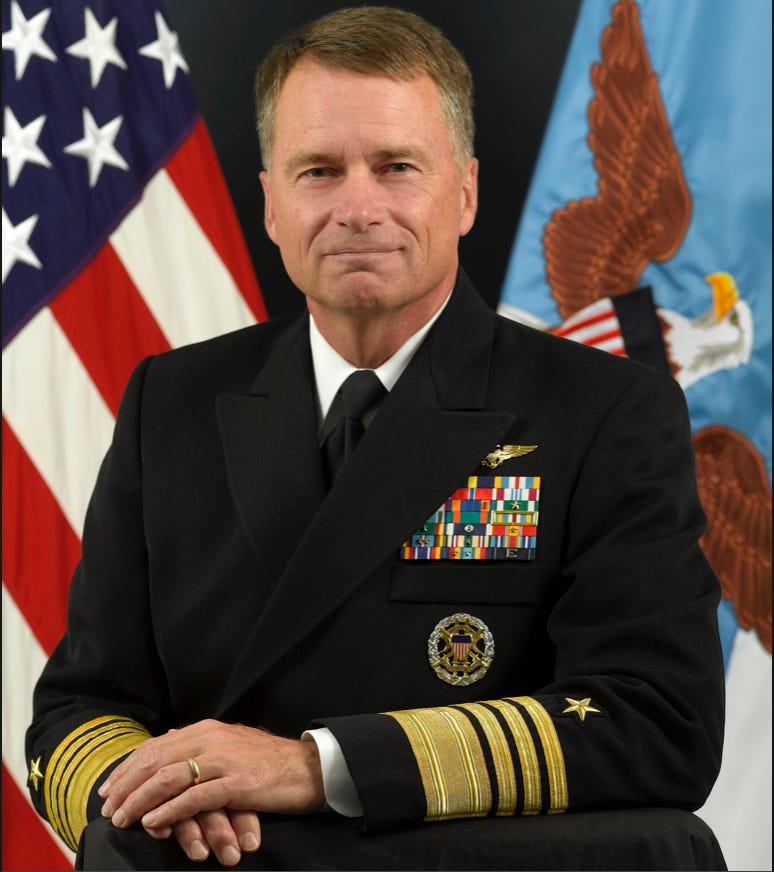This profile of Admiral Sandy Winnefeld originally appeared as part of a longer article in Georgia Tech’s alumni magazine here.
Someone who knows what it’s like to be put on the spot—and respond intelligently and fearlessly—is retired Admiral Sandy Winnefeld ’78, the former Vice-Chairman of the Joint Chiefs of Staff who teaches in the Sam Nunn School of International Affairs. Prior to serving as the nation’s second highest ranking military officer for four years, he commanded the U.S.S. Theodore Roosevelt Carrier Strike Group and NORAD, the North American Aerospace Defense Command which protects the U.S. from missile attack.
Winnefeld is no stranger to teaching. After flying the F-14 Tomcat off carrier decks, he was an instructor at Top Gun, the Navy’s school for elite fighter pilots. “That’s where I cut my teeth on learning how to teach, because our standards were so high,” he says. To earn the honor of lecturing pilots, Winnefeld had to have his presentation critiqued by a “Murder Board,” fellow officers who spent a day tearing apart its smallest flaws.
When asked what makes a good teacher, Winnefeld has a ready answer. “First, you need to think hard about the material from the students’ perspective, how you present it, and how you inculcate in their minds a fundamental understanding of what the topic is about rather than teaching its nitnoid details. For example, if I were teaching math, I'd want to teach the why behind the math. Why is it useful? What are its applications?
“The most important thing is to approach the subject empathetically from the students’ point of view and make it as interesting as possible so they get energized to learn on their own. You also need to dedicate a little personal time to helping them if they're struggling and sit down privately with them if they need help.”
Not surprisingly, Winnefeld holds his students to the highest standards. When he helped attorney Joseph Bankoff, another Professor of the Practice, teach the class Global Issues and Leadership, they winced at students’ poor presentations. Although class members improved as the term went on, both men knew they had to drill better speaking skills into their next crop of students.
When the course was offered again, they wanted students to start from a firmer foundation, so they focused its first session on the art of giving presentations. Even then students did not get off easy. They ultimately had to appear before their own ‘Murder Board,’ an all-star panel that included Winnefeld, Nunn, and General Philip Breedlove CE ’77, the former Supreme Allied Commander of NATO.
“I tried to make it so students weren't intimidated by me personally, but it had to be tough for them to stand in front of a former Senator, an Air Force general, a Navy admiral, and who knows who else Joe brought in,” Winnefeld recalls.
Like other Professors of the Practice, Winnefeld knows that writing a brilliant paper, a skill drilled into students, is only the first part of the battle once they graduate. “You’ve got to present it, too,” he says. “If you want to be successful in the policy world, you've got to be comfortable presenting credibly to senior people who are going to ask you tough questions, and that's why we brought in the people we did.”
Dan Aum, a PhD student in international studies, gets a double-barreled dose of professional training. He works as research assistant to Winnefeld who is collaborating with Breedlove on a scholarly paper about how the U.S. and its allies should deter China from attacking Taiwan and how it should respond if it did.
“Admiral Winnefeld has a four-star mind,” says Aum. “He’s not someone who pushes out orders. He’s a keen observer of people’s processes, motivations, and priorities. So, when he shares his insights, I get to see those processes through his sharp perceptions. I get feedback from someone with his level of experience and get a sturdy sense of whether ideas will work or not in the real world."
For more stories similar to this one, buy my book Courage 101: True Tales of Grit & Glory.




